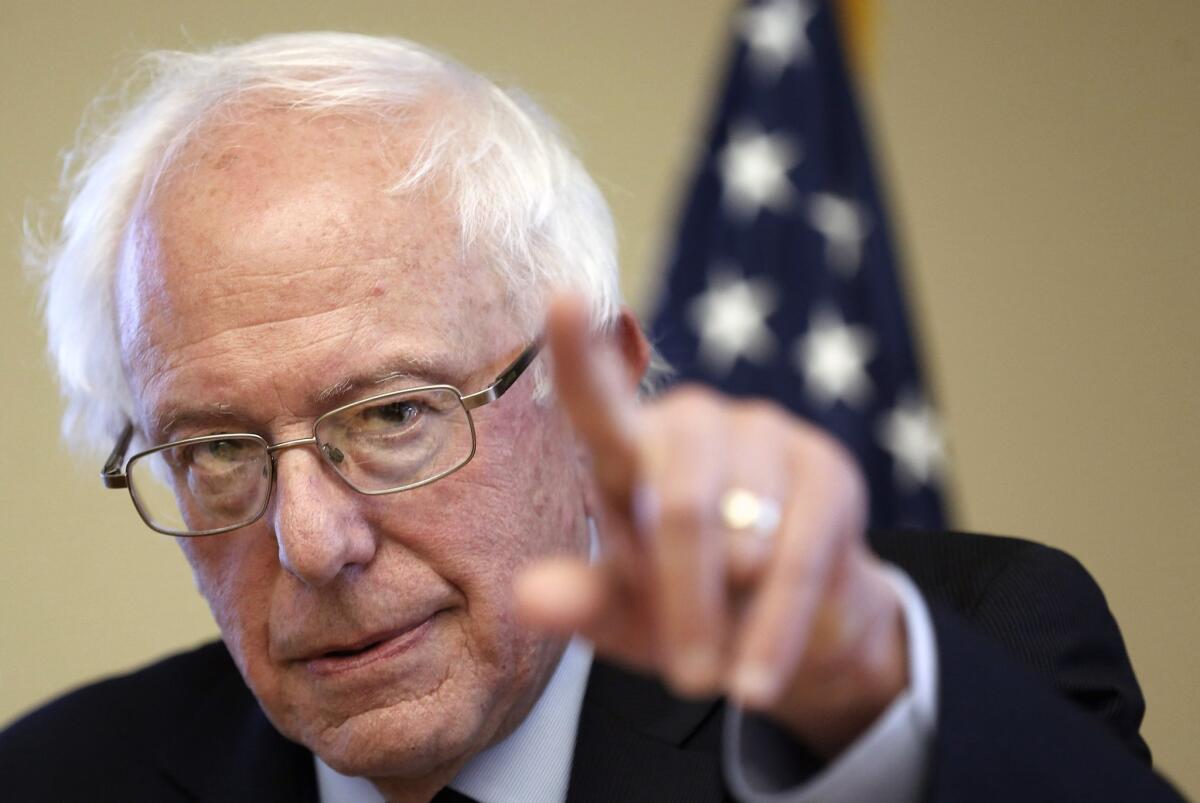Op-Ed: A conservative explains what he likes about Bernie Sanders

Presidential candidate Sen. Bernie Sanders speaks during a campaign stop at a senior center in Manchester, N.H. on Oct. 30.
- Share via
Bernie Sanders’ success on the campaign trail does not defy explanation in quite the way that Donald Trump’s does — Sanders has not dominated the polls, for one thing — but it’s improbable all the same. He is a 74-year-old grandfather with thick glasses and frequently disheveled white hair. And as an avowed socialist, or “social democrat,” he routinely enunciates positions that almost no successful high-level politician in the U.S. has ever held: for instance, that higher education ought to be free for everyone.
There are no doubt convincing political/demographic reasons for Sanders’ competitiveness at this stage, the most obvious being that the longtime Democratic front-runner, Hillary Rodham Clinton, is widely regarded as unprincipled and insufficiently liberal. But none of these reasons explain why I like Sanders. I’m not a Democrat, a socialist or a social democrat. I’m a conservative.
Every politician caricatures his opponents from time to time. But Sanders doesn’t overdo it.
Let me stress: I would not vote for Sanders under any circumstance. I find some of his statements reprehensible, as when he says that the U.S. is not a just society “or anything resembling a just society today.” That’s a preposterous slur.
Yet I enjoy listening to him speak and rather envy those who can in good conscience support his candidacy. My reluctant admiration began when I heard him in a radio interview. “In my view,” he told the interviewer, “healthcare is a right, not a privilege.”
It is a recurring line in Sanders’ campaign, and it is deeply misguided. It makes nonsense of the concept of rights. Healthcare, in the sense in which we use the term, has only existed for a century or so; to claim we have some inherent “right” to it is an abuse of language. And as a practical matter, guaranteeing a “right” to any product or service — healthcare, broadband Internet — can only produce effects opposite from the ones intended: lower quality, higher prices, decreased access.
But it wasn’t the content of Sanders’ claim that caught my attention. It was that little introductory phrase: “In my view.” How refreshing to hear a politician — an ambitious one at that — refer to an ideological stance as a “view.” The phrase suggests that he acknowledges the existence and legitimacy of other views.
“In my view,” he said in the first Democratic debate, “what we need to do is create millions of jobs by rebuilding our crumbling infrastructure, raise the minimum wage to $15 an hour” and several other things that, if done in tandem, would ruin the nation’s economy for a generation. Very few politicians characterize their views as views in this way, so terrified are they that someone might not treat their assertions as peremptory truth.
The contrast with Clinton is revealing. Clinton does not speak of her “view” or “opinion.” When she subjectifies her claims at all, she speaks of what she believes or thinks — and what she believes or thinks is almost invariably some empty proposition with which it would be difficult or impossible to disagree.
Examples from last month’s debate: “I think that we have to look at the fact that we lose 90 people a day from gun violence.” “I believe strongly that we need to be talking about what people talk to me about, like how are we going to make college affordable?” Is there someone who doesn’t think we should look at gun violence statistics? And who could disagree that we need to be talking about what people talk to Clinton about?
In September, Sanders delivered a speech to the evangelical Liberty University, and it was, as one might expect, full of subjective qualifications. “Those are my views, and it is no secret,” he said at one point. It also contained a lovely, seemingly impromptu passage in which he noted that political candidates like himself tend to speak only to people who already agree with them. “It’s harder, but not less important,” he went on to say, “for us to try and communicate with those who do not agree with us on every issue. And it is important to see where, if possible — and I do believe it is possible — we can find common ground.”
Every politician caricatures his opponents from time to time. But Sanders doesn’t overdo it. He doesn’t portray them as lunatics who appeal only to other lunatics, and he doesn’t pretend that his is the only valid position or that his agenda is all but universally accepted.
“If you think establishment politics and establishment economics is the answer to our problems, fine,” he said in a recent interview. “There are good candidates out there. But if you think it’s time for what I define as a political revolution, and that means involving millions and millions of people in the political process today in a way that has never been the case before, then I think I’m your candidate.”
By comparison with Clinton, Sanders is the more pugnacious candidate: the truth teller, the straight talker. He does not promise, as she does, that he will bring people together and “heal the divides.” How curious, then, that it’s Sanders, not Clinton, who shows us how to accomplish that end.
Barton Swaim is the author of “The Speechwriter: A Brief Education in Politics.”
Follow the Opinion section on Twitter @latimesopinion and Facebook.
MORE FROM OPINION:
Why Ben Carson has no business near the Oval Office
The myth of the eternal war between science and religion
Hearings on California ballot initiatives will help voters at the polls
More to Read
A cure for the common opinion
Get thought-provoking perspectives with our weekly newsletter.
You may occasionally receive promotional content from the Los Angeles Times.









